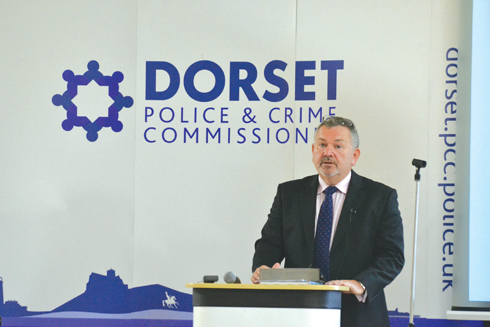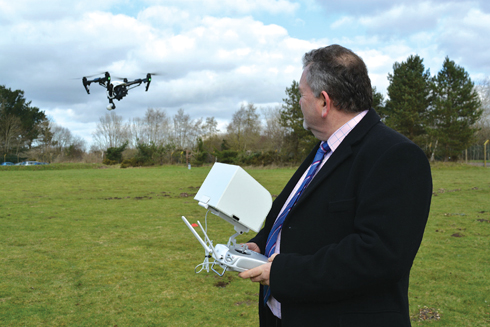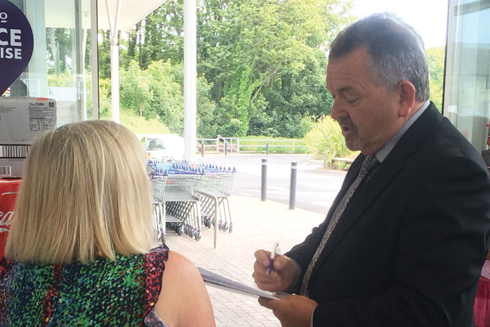End of term report: Dorset’s first Police & Crime Commisioner
Dorset’s first PCC, Martyn Underhill, reflects with David Callaghan on policing and the role of the PCC ahead of this month’s election
Published in May ’16
Dorset Police has been rated ‘good’ in the independent reports published annually by Her Majesty’s Inspectorate of Constabulary (HMIC), but there is still a lot of hard work to be done. So says the county’s Police and Crime Commissioner, Martyn Underhill, as he considers the legacy of his first term and prepares to stand for re-election on 5 May.
‘These ratings are crucial because they strike at the heart of policing by consent, although there’s much more that we need to do,’ he says. ‘I’m particularly conscious that in my first term I spent a lot of time on dealing with how we absorbed the cuts that were forced on us by central government, on introducing innovative technology to the force and on making us ready to tackle cybercrime more effectively. What I didn’t do was bring any clear focus on rural crime: our rural communities encounter crimes that have a great financial effect on their victims, and it is up to Dorset Police to adapt in order to deal with it. That is why I will see to it that Dorset establishes a Rural Crime Team.’
When Martyn Underhill was elected as Dorset’s first Police and Crime Commissioner in November 2012, few knew what to expect. As a Sussex Police officer, he had been second in command in the investigation of the murder of Sarah Payne in 2000 before retiring to Dorset in 2009. He stood as an Independent against Conservative and Labour party political candidates to act as the link between the public and the police, represent public opinion to the police and take responsibility for the police budget.
‘I can’t say I’m not political because I became a politician the day I was elected to public office,’ he says, ‘but party politics have no place in this job. I have very good working relationships with senior politicians including the Home Secretary, but I don’t want to be under a party whip – what does Westminster know about what’s best for Dorset?’
Dorset Police has been particularly hard hit by cuts totalling more than £18 million over the last four years – it is one of the lowest centrally funded forces in the country – but unlike other forces, it has been very cautious about privatising services. Martyn Underhill is determined that this should remain the case: ‘I will not see Dorset go the way of Lincolnshire Police, which was on the verge of going bankrupt after its budget was cut and could no longer pay for some of its contracted services.’ However, Dorset Police is working with Securitas, the private company, which provides security guards on crime sites: ‘That is the only area that has been outsourced and it works very well. The public has accepted it and officers are on board with it. It means that instead of having several officers on duty at a crime scene, we need only have one officer in charge on site, backed up by perimeter security guards.’
Technical innovation has been at the heart of Martyn Underhill’s efforts to help make Dorset Police fit ‘to meet 21st-century challenges’, as he puts it. Not only are more officers than ever engaged in fighting crime online, the force is leading the way in the use of drones. ‘I believe drones will have as great an impact on policing as panda cars and radios did in the 1960s. I’d like us to explore the use of balloons with fixed cameras as well, particularly in rural areas.’

Martyn Underhill with two Police Community Support Officers on the PCC’s stand in September last year
‘I’ve learned many things over the last three years,’ says the Commissioner, ‘but perhaps the most important thing is that the public draws the line when it comes to losing a bus route, a library or a police station. Those are the last vestiges of our national identity, it seems. When Dorset Police wanted to close twelve police stations, I insisted we go to consultation and managed to save six of them. That was a clear demonstration of the role of the PCC.
‘Similarly, the non-emergency 101 number had a terrible reputation when it was introduced and, although we’re not there yet, we have done a lot of work on improving the way calls are dealt with and educating the public about its use. There’s a new website about to be launched which will make it easier to report crime online – 83 per cent of the population use the internet, but we’re not forgetting about the other 17 per cent either.’
After being outraged to learn that people had been tasered by officers in police cells, Martyn made representations to the Home Secretary and all uses of force in Dorset, from compliant use of handcuffs to fatal use of firearms, are now recorded on a database that can be viewed online by the public. The scheme will roll out nationally from April next year.
‘I was also able to take an adult rape victim and the mother and victim of child rape to meet the Chief Constable because I felt that they had been failed by the poor level of service they had received. The Chief Constable was able to apologise and assure them that the way complaints are dealt with in the future will change.’
Martyn Underhill never expected an easy time as Police and Crime Commissioner, nor has he had one, but there are compensations and the job has afforded him a unique perspective on Dorset life. ‘I feel blessed to live here,’ he says, ‘but every single community reacts differently, even when they’re only a few miles apart. I grew up in Lincolnshire, joined the Met and then worked in Sussex, and the expectations of Dorset people, their insistence on having the best service and being treated with the highest regard, far exceed anything I have encountered before. Anyone in this job or any other who forgets that does so at their peril.’ ◗





